ChatGPT or Google Translate translates better?
From content writing and programming to product design and data analysis, ChatGPT instantly impacts almost every digital sector imaginable.
However, one area where ChatGPT could have a particular impact is machine translation. Currently, Google Translate is the leading name in the market.
But with the rise of ChatGPT, will Google Translate's dominance be challenged? The article will compare ChatGPT with Google Translate to see which tool can provide better translations.
Translate colloquial words
When translating colloquial words, the translation may not retain the same meaning and tone as the original language.
The article asked Google Translate and ChatGPT to translate the simple English expression "Juan kicked the bucket" into Spanish. Both translation services produce the result "Juan pateó el bade" , the literal translation of the idiom. While this is effective, the meaning or purpose will be completely lost to someone who does not understand the context.
ChatGPT offers more help. Instead of just asking ChatGPT to translate, you can ask ChatGPT to provide "meaning in Spanish" or "provide meaning in English", depending on the language you're translating to. In this case, ChatGPT will provide literal translations and idiomatic explanations.
The article tried several other colloquialisms, and both services almost always provided literal translations. While this works, it can provide misleading information in some cases. ChatGPT's ability to provide "explanations" rather than just literal translations for colloquial words is an advantage.
But one task is not enough to draw a conclusion, so this time the article uses a Filipino idiom.
'Sa gitna ng kagutumang buto't balat at butas na bulsang kahirapan, mataba ang lupa para sa pagtatagumpay ng anakpawis'
The closest translation of the source text should be: 'In the midst of extreme poverty, land is a solid fulcrum for the victory of the working masses'.
ChatGPT gives the following results:
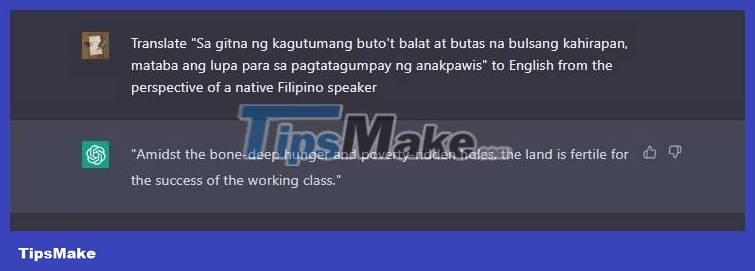
And here is the Google Translate result:
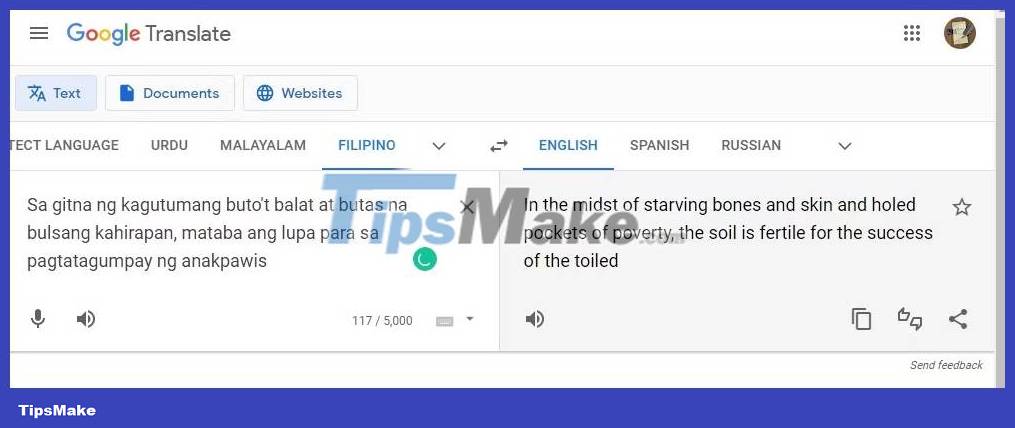
This clearly made it difficult for both tools, but Google Translate seemed to have the edge.
Of course, things get even more difficult when switching to the Malayalam language. The task of both translation tools is to interpret an excerpt from a fairly popular novel in Malayalam.
ChatGPT tried translating, but clearly complex Malayalam text is not one of ChatGPT's strong points.

On the other hand, Google has done quite well.

No tool can do it perfectly, but Google Translate is as close as you can get. This is a tough competition. Although Google Translate has the advantage, ChatGPT can provide meanings of idioms instead of just translations. This can be very useful when translating large amounts of text containing idioms. In such cases, translating an idiom literally can cause confusion when read in conjunction with the surrounding text.
General accuracy
Small differences between the source text and its translation can completely change the meaning of the text. Therefore, the article tested both Google Translate and ChatGPT to see their overall translation accuracy.
Let's start simply with a Chinese philosophy text:
在这个虚伪的社会中,真正的人格是一种罕见的珍贵财富。
The closest translation of this is 'In this hypocritical society, genuine character is a rare asset'. Again, both ChatGPT and Google Translate worked fine. There is no difference in translation.
Next came the task of translating into Filipino.
Ang gamot sa topaking babae ay ang lambing ng isang maunawaing lalaki
The source text contains a bit of wordplay. Google gives the translation as: "The medicine for a woman is the tenderness of an understanding man" . So it wasn't a total disaster, but it didn't convey the right tone of message.
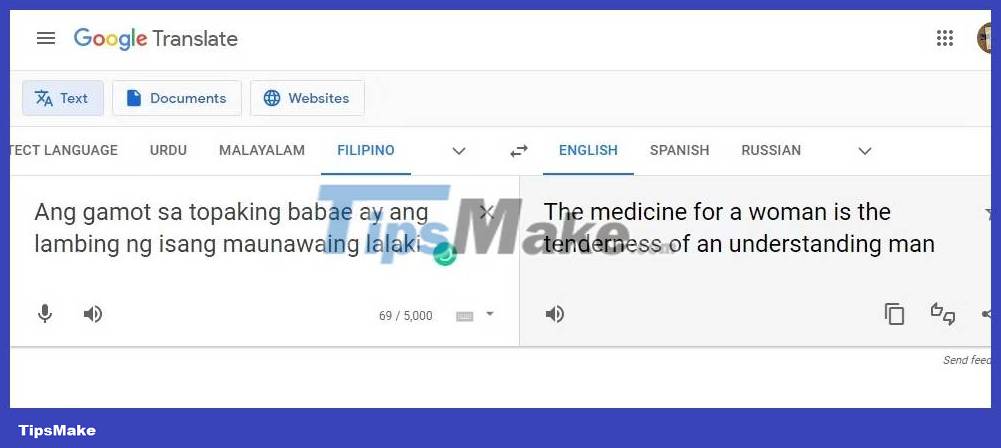
On the contrary, ChatGPT gives the result: "The cure for a heartbroken woman is the affection of an understanding man" .
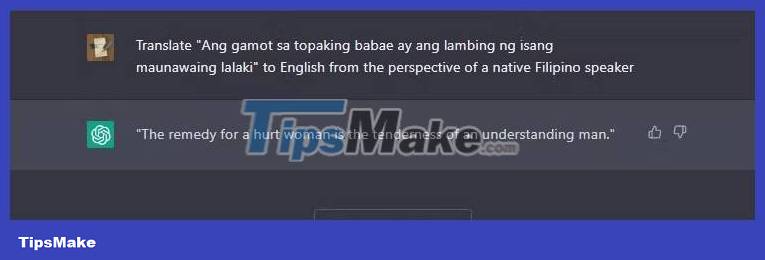
No translation is particularly perfect, but ChatGPT gives the closest results.
Creole translation
Creole languages, especially those that borrow heavily from other languages, are notoriously difficult to translate. The article tasked both ChatGPT and Google Translate with translating a creole called "Pidgin English" used in West Africa.
Below is the source text:
"Wetin come happen na. Since you said you go come help me with that thing, I no come see your brake light. Wetin sup?"
In the source text, the speaker is complaining to the reader that they promised to help with something but haven't seen anything since. Then it ends with "What's going on?"
Although Google Translate understood "Pidgin English" to some extent, it failed miserably at translating the source text. Part of the problem was Google Translate's ability to distinguish Creole from English. limited due to the presence of English words.

Although not perfect, ChatGPT's interpretation was able to clearly convey the meaning and intention of the speaker. Considering the highly contextual nature of Pidgin English, the results are impressive.
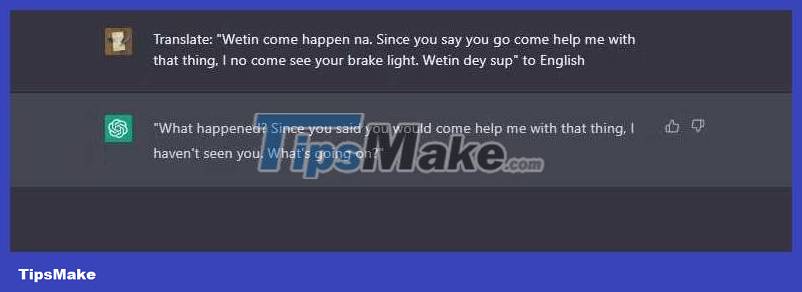
Language range
Comparing the language coverage between ChatGPT and Google Translate is a bit complicated. Google Translate covers more than 140 languages and that number is constantly growing. This is because Google regularly adds new languages to the Google Translate tool. On the other hand, for ChatGPT, there is no official number on the number of languages this tool can support. However, based on how ChatGPT was trained, there is a reasonable basis to conclude that the coverage is significantly greater than that of Google Translate.
Of course, the article tested ChatGPT on some languages not supported by Google Translate. It can provide translations for these additional languages, which Google Translate does not offer. However, the quality of ChatGPT's translations for these unsupported languages is somewhat inconsistent. While some translations are quite accurate, others are quite poor and inaccurate. Although ChatGPT covers more languages, the translations it provides for many of them fall far short of expectations in terms of accuracy.
Which translation tool is better?
It's difficult to give an exact answer. Both translation tools have their own strengths. Google has invested heavily in natural language processing (NLP). As a result, the tool performs better than ChatGPT in the languages it specifically focuses on. However, considering how ChatGPT works and its training process, it represents a unique and interesting approach to translation. So which of these tools should you use? Both tools are free, so feel free to experiment and decide which one is right for you.
You should read it
- ★ How to translate web pages into Vietnamese, English or any language
- ★ How to use AZ Translate screen, voice, photo
- ★ How to use Google Translate Offline on a windows computer
- ★ How to Scan and Translate with Google translate
- ★ For the first time in 4 years, Google Translate is adding new languages